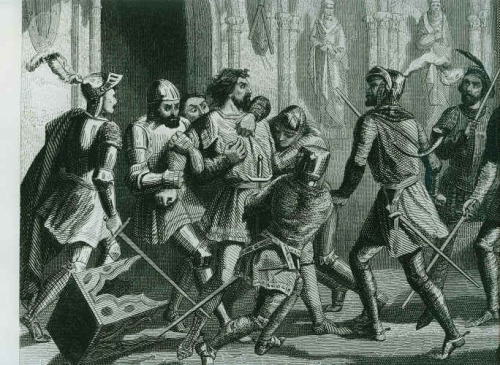illvedere:Tropes similars als Almogàvers durant la Conquesta de Mallorca el segle XIII. Detenció de
illvedere:Tropes similars als Almogàvers durant la Conquesta de Mallorca el segle XIII. Detenció de Bernat de Rocafort.Companyia Catalana d'Orient officially the Magna Societas Catalanorum, sometimes called the Grand Company and widely known as the Catalan Company, was a free company of mercenaries founded by Roger de Flor in the early 14th century. De Flor recruited soldiers left unemployed with the Peace of Caltabellotta in 1302 by the Crown of Aragon who opposed the French dynasty of Anjou. In 1303 de Flor offered the services of his Company to the Byzantine emperor Andronicus II Palaeologus and his son the Basileus Michael IX Palaeologus. The Byzantine Empire was under threat by the Turks who were invading Anatolia.Roger de Flor’s offer was accepted by both Byzantium and by the Catalan, rulers in Sicily and southern Italy, who were quite eager to rid themselves of unemployed and unruly soldiers. Roger de Flor departed with 39 galleys and transports carrying around 1,500 knights and 4,000 Almogavars, special foot soldiers employed mainly serving the kingdom’s interests in the Mediterranean Sea, especially from Catalonia.Roger de Flor campaigned with his Company in Anatolia, defeating the Turks but also engaging in widespread violence and looting of the Byzantine inhabitants. By this point, the Catalans, who had recruited nearly 3000 Turkic horse into their ranks, were considered by the Byzantines to be little better than brigands and freebooters. The successes had inflated the already arrogant De Flor, leading him to entertain plans of establishing his own dominion in Anatolia.This put him at odds with the Byzantine Emperor, and the indiscipline of the Almogavars marked the end of Roger de Flor. On 30 April 1305, he was slain along with 300 cavalry and 1,000 infantry by the Alans, another group of mercenaries at the service of the Emperor. The Company proceeded to devastate the regions of Thrace and Macedonia for the next two years, including an attack on Thessalonica by land and sea, and raids against the monasteries on Mount Athos. Until recently no Catalans were allowed on the Athos peninsula by the Athonite monks. However in the past few years and following the payment of reparations by the Catalan government this situation has changed. Harassed by the Byzantine army under the general Chandrenos, the Catalans eventually left Macedonia, and in spring 1309 invaded Thessaly.In 1318 the Company expanded its power into Thessaly, taking control of the Duchy of Neopatria.The Catalan rule was to last until 1388–1390 when they were defeated by the Navarrese Company under Pedro de San Superano, Juan de Urtubia, and allied with the Florentines under Nerio I Acciaioli of Corinth. His descendants controlled them until 1456 when they were conquered by the Ottoman Empire. By that time, like many military enterprises, the Great Company had faded out of history. -- source link
#medieval#history#14th century#mercenary#byzantine empire#catalan company

